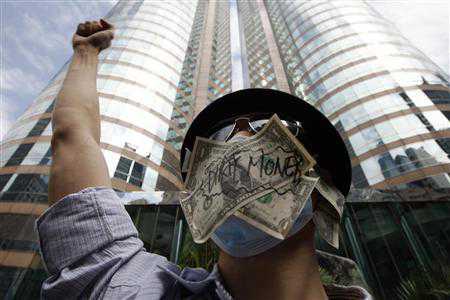By Andrew Rettman

BRUSSELS – Eurozone countries will have to give up on normal democracy and the European Central Bank (ECB) will have to print money if the euro is to survive, Turkey’s ambassador to the EU has said on the eve of the EU summit.
Noting that EU leaders are going in “the right direction” by proposing central control over national budgets in return for help from the ECB, Selim Kuneralp told EUobserver in an interview on Wednesday (7 December) that traditional democratic structures have no future in post-crisis Europe.
“In an election campaign, you have one party that says ‘I’m going to reduce taxes and invest in this or that, to build nuclear power plants or spend money on renewable energy, build more schools and better hospitals.’ And the other party says ‘I’m going to do everything this guy is promising, but more.’ So you have a race on who is going to spend more. But if you have this kind of mechanism [of central control] they won’t be able to do it.”
“That means you would have such a loss of sovereignty as to make election campaigns meaningless,” he added.
“I don’t see any other option – either you have a single currency with fiscal union or you don’t have a single currency at all.”
With Germany in the driving seat on EU reforms, Kuneralp said German society has set a good example over the past 10 years by keeping wages low and making sure banks lend responsibly: “They’ve been good boys. They’ve been Germans … They are responsible people. In Greece, you can go to the bank and borrow money to go on holiday. In Germany you can only borrow money for some productive purpose.”
He noted that if EU institutions are in future to police national spending, they will have to do a better job than in the past, however.
Looking back to the Greek statistics fiasco in 2010, when Athens admitted to lying for years about debt and GDP, Kuneralp said EU officials must share the blame: “When I talk to people in the commission, they say ‘Well, you know, the Greeks lied and that was it.’ Well, they may have lied, but your job was to find them out. The commission were not doing their job properly and you need a mechanism that makes sure they do their job properly and expose liars and fiddlers.”
He added that Germany will have to drop its opposition to letting the ECB create money to prop up eurozone debt.
Kuneralp pointed out that the US and the UK have done better than euro countries in the crisis by adding zeros to central bank reserves – $1.4 trillion in the case of the US, the equivalent of Turkey’s GNP for two years.
“The Americans have added zeros to their ledgers and it has had no visible impact on inflation … The lesson is that you can do it,” he said. “In the end, the Germans will have to move in the direction of more flexibilty and allow some buyback or some other instrument that is a euphemism for printing money … You have to reduce your debt by having a little bit more inflation – you print your way out of this conundrum.”
The ambassador noted that while Turkish banks have almost no exposure to bad eurozone debt, the Turkish economy is at grave risk if the euro goes down – 50 percent of Turkish trade is with the Union, 80 percent of foreign investment and 70 percent of its tourist income also come from the bloc.
“We are not rejoicing. There’s no schadenfreude. We’re not saying: ‘Oh well. You deserve this for not taking us into the EU’,” he told this website.
On a note of optimism, the veteran 60-year-old diplomat, who was Ankara’s sherpa for three G20 summits in 2008 and 2009, said the climate of panic in the media is over the top.
“I read one comment which said ‘This is the most historic, the most crucial summit since … the summit of 26 October.’ So, all this hype, I don’t know how far to take it seriously,” Kuneralp said. “They [EU leaders] can’t allow this whole structure to collapse. I can’t believe this is going to happen, so they will take the right decisions in the end.”
via EUobserver.com / Economic Affairs / Turkey to EU: say goodbye to democracy and start printing money.


